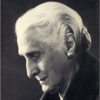Happy the man, of mortals happiest he,
Whose quiet mind from vain desires is free;
Whom neither hopes deceive, nor fears torment,
But lives at peace, within himself content;
In thought, or act, accountable to none
But to himself, and to the gods alone.George Granville (1666-1735) English politician, poet, playwright [1st Baron Lansdowne]
“Epistle to Mrs. Higgons,” l. 79ff (1690)
(Source)
Quotations about:
acceptance
Note not all quotations have been tagged, so Search may find additional quotes on this topic.
FOOL: He that has and a little tiny wit,
With hey, ho, the wind and the rain,
Must make content with his fortunes fit,
Though the rain it raineth every day.William Shakespeare (1564-1616) English dramatist and poet
King Lear, Act 3, sc. 2, l. 81ff (3.2.81-84) (1606)
(Source)
Never turn down the chance of an adventure, unless such chances are coming thick and fast, and maybe not even then.
Mignon McLaughlin (1913-1983) American journalist and author
The Second Neurotic’s Notebook, ch. 4 (1966)
(Source)
To understand the actual world as it is, not as we should wish it to be, is the beginning of wisdom.
Bertrand Russell (1872-1970) English mathematician and philosopher
“Censorship by Progressives,” New York American (1934-10-11)
(Source)
Selfishness must always be forgiven, you know, because there is no hope of a cure.
The way to achieve happiness is to have a high standard for yourself and a medium one for everyone else.
Marcelene Cox (1900-1998) American writer, columnist, aphorist
“Ask Any Woman” column, Ladies’ Home Journal (1954-08)
(Source)
Two conditions are essential to the realization of justice according to law. The law must have an authority supreme over the will of the individual, and such an authority can arise only from a background of social acquiescence, which gives it the voice of indefinitely greater numbers than those of its expositors. Thus, the law surpasses the deliverances of even the most exalted of its prophets; the momentum of its composite will alone makes it effective to coerce the individual and reconciles him to his subserviency. The pious traditionalism of the law has its roots in a sound conviction of this necessity; it must be content to lag behind the best inspiration of its time until it feels behind it the weight of such general acceptance as will give sanction to its pretension to unquestioned dictation.
Learned Hand (1872-1961) American jurist
“The Speech of Justice,” Harvard Law Review (1916-04)
(Source)
Collected in The Spirit of Liberty (1953).
One of the evils of democracy is you have to put up with the man you elect whether you want him or not.
Two persons will not be friends long if they are not inclined to pardon each otherʼs little failings.
[L’on ne peut aller loin dans l’amitié, si l’on n’est pas disposé à se pardonner les uns aux autres les petits défauts.]
Jean de La Bruyère (1645-1696) French essayist, moralist
The Characters [Les Caractères], ch. 5 “Of Society and Conversation [De la Société et de la Conversation],” § 62 (5.62) (1688) [tr. Van Laun (1885)]
(Source)
(Source (French)). Alternate translations:
Two persons will not be friends a long time, if they can't forgive each other little failings.
[Bullord ed. (1696)]
Two Persons will not be long Friends, if they can't forgive each other little Failings.
[Curll ed. (1713)]
You will never go far in friendship unless you are ready to forgive each other's petty faults.
[tr. Stewart (1970)]
The only way to make sense out of change is to plunge into it, move with it, and join the dance.
Alan Watts (1915-1973) Anglo-American philosopher, writer
The Wisdom of Insecurity: A Message for an Age of Anxiety, ch. 3 (1951)
(Source)
MALCOLM: Nothing in his life
Became him like the leaving it. He died
As one that had been studied in his death
To throw away the dearest thing he owed
As ’twere a careless trifle.William Shakespeare (1564-1616) English dramatist and poet
Macbeth, Act 1, sc. 4, l. 8ff (1.4.8-12) (1606)
(Source)
Art is anything you can get away with.
Marshall McLuhan (1911-1980) Canadian philosopher, communication theorist, educator
The Medium is the Massage: An Inventory of Effects (1967) [with Quentin Fiore]
(Source)
More discussion of this quotation: Art Is Anything You Can Get Away With – Quote Investigator.
Such is the life of man, nor wholly blest,
Nor wholly wretched; on her votaries Fortune
now smiles, then frowns. Since our prosperity
Is thus unstable, is not an exemption
From grief the greatest pleasure life can yield?[τοιόσδε ϑνητῶν τῶν ταλαιπώρων βίος’
οὔτ᾽ εὐτυχεῖ τὸ πάμπαν οὔτε δυστυχεῖ,
εὐδαιμονεῖ δὲ καύϑις οὐκ εὐδαιμονεῖ.
τί δῆτ᾽ ἐν ὄλβω μὴ σαφεῖ βεβηκότες
οὐ ξῶμεν ὡς ἥδιστα μὴ λυπούμενοι;]Euripides (485?-406? BC) Greek tragic dramatist
Antiope [Αντιοπη], frag. 196 (TGF, Kannicht) (c. 410 BC) (Amphion?) [tr. Wodhall (1809)]
(Source)
(Source (Greek)). Alternate translation:
Such is the life of wretched mortals;
a man is neither wholly fortunate nor unfortunate;
why then, on entering prosperity which may be insecure,
do we not live as pleasantly as possible, without distress?
[Source]
Such it is, the life of miserable mortals:
neither wholly fortunate nor unfortunate.
He is prosperous and then he is not prosperous.
Why then, when we stand in uncertain happiness,
do we not live as pleasurably as possible, without distress.
[tr. Will (2015)]
Galla, deny; and render passion strong:
But, prudent Galla, don’t deny too long.[Galla, nega: satiatur amor nisi gaudia torquent:
sed noli nimium, Galla, negare diu.]Martial (AD c.39-c.103) Spanish Roman poet, satirist, epigrammatist [Marcus Valerius Martialis]
Epigrams [Epigrammata], Book 4, epigram 38 (4.38) (AD 89) [tr. Elphinston (1782), Book 12, ep. 195]
(Source)
(Source (Latin)). Alternate translations:
Galla deny, be not too eas'ly gain'd,
For Love will glut with Joys too soon obtain'd.
[tr. Cotton (1686)]
Galla, say "No:" love is soon sated, unless our pleasures are mixed with some pain;
but do not continue, Galla, to say "No" too long.
[tr. Bohn's Classical (1859)]
Refuse me, Galla; love cloys if its pleasures torture not:
but refuse not, Galla, too long.
[tr. Ker (1919)]
Galla, say "no" -- Tease love and you renew it.
But prithee, Galla, do not overdo it.
[tr. Pott & Wright (1921)]
Say you won't Galla: For passion cloys
if its joys are not tormenting
But don't take too long in relenting!
[tr. Bovie (1970)]
Galla, say no, for love, unless
It teases, cloys with happiness.
Don't take too long, though, to say yes.
[tr. Michie (1972)]
Galla, say no. Love palIs, unless its joys are torture. But Galla, don't say no for too long.
[tr. Shackleton Bailey (1993)]
A "No" can build love's piquancy,
But don't, too long, say "No" to me.
[tr. Ericsson (1995)]
Galla, say no. Love is satiated unless pleasures torment.
But, Galla, do not say no for too long!
[tr. Williams (2004)]
"No" is enticing; so is wooing slow.
But nothing works till you stop saying "No."
[tr. Wills (2007)]
Galla, say no. Some torment makes love stronger.
But, Galla, don’t keep saying no much longer.
[tr. McLean (2014)]
Galla, tell me "No": love stales unless its joys bring pain.
But, Galla, don't say "No" for very long.
[tr. Nisbet (2015)]
Without a wait
or some hard trial,
love won’t amuse me.
So hesitate
(just for a while ...)
[tr. Juster (2016)]
Galla, say No, for Love will cloy
Without some torments mixed with joy.
But, Galla, do not get me wrong --
Please don’t say No to me too long.
[tr. Barger]
Friendship is the gift that goes on giving and is a gift to both the person given to and to the giver as well. But to really make it work, it isn’t enough to give to another person. You also have to let them give to you.
After the first blush of sin comes its indifference; and from immoral it becomes, as were unmoral, and not quite unnecessary to that life which we have made.
Henry David Thoreau (1817-1862) American philosopher and writer
“On the Duty of Civil Disobedience” (1849)
(Source)
Men are accomplices to that which leaves them indifferent.
George Steiner (1929-2020) Franco-American literary critic, philosopher, writer, educator
“A Kind of Survivor” (1965), Language and Silence: Essays 1958-1966 (1967)
(Source)
This is what the prophets discovered. History is a nightmare. There are more scandals, more acts of corruption, than are dreamed of in philosophy. It would be blasphemous to believe that what we witness is the end of God’s creation. It is an act of evil to accept the state of evil as either inevitable or final. Others may be satisfied with improvement, the prophets insist upon redemption. The way man acts is a disgrace, and it must not go on forever.
What is the new loyalty? It is, above all, conformity. It is the uncritical and unquestioning acceptance of America as it is — the political institutions, the social relationships, the economic practices. It rejects inquiry into the race question or socialized medicine, or public housing, or into the wisdom or validity of our foreign policy. It regards as particularly heinous any challenge to what is called “the system of private enterprise,” identifying that system with Americanism. It abandons evolution, repudiates the once popular concept of progress, and regards America as a finished product, perfect and complete.
The greatest danger that threatens us is neither heterodox thought nor orthodox thought, but the absence of thought.
Henry Steele Commager (1902-1998) American historian, writer, activist
Civil Liberties under Attack (1951)
(Source)
Nothing I accept about myself can be used against me to diminish me.
Audre Lorde (1934-1992) American writer, feminist, civil rights activist
“Eye to Eye: Black Women, Hatred, and Anger,” Sister Outsider: Essays and Speeches (1984)
(Source)
Truths that startled the generation in which they were first announced become in the next age the commonplaces of conversation; as the famous airs of operas which thrilled the first audiences come to be played on hand-organs in the streets.
The nationalist not only does not disapprove of atrocities committed by his own side, but he has a remarkable capacity for not even hearing about them. […] In nationalist thought there are facts which are both true and untrue, known and unknown. A known fact may be so unbearable that it is habitually pushed aside and not allowed to enter into logical processes, or on the other hand it may enter into every calculation and yet never be admitted as a fact, even in one’s own mind.
George Orwell (1903-1950) English writer [pseud. of Eric Arthur Blair]
“Notes on Nationalism” (May 1945)
(Source)
“So, Jeeves!”
“Yes, sir.”
“What do you mean. Yes, sir?”
“I was endeavouring to convey my appreciation of the fact that your position is in many respects somewhat difficult, sir. But I wonder if I might call your attention to an observation of the Emperor Marcus Aurelius. He said: ‘Does aught befall you? It is good. It is part of the destiny of the Universe ordained for you from the beginning. All that befalls you is part of the great web.'”
I breathed a bit stertorously.
“He said that, did he?”
“Yes, sir.”
“Well, you can tell him from me he’s an ass.”
P. G. Wodehouse (1881-1975) Anglo-American humorist, playwright and lyricist [Pelham Grenville Wodehouse]
The Mating Season, ch. 4 (1949)
(Source)
Adapted from Marcus Aurelius, Meditations, Book 4, #26 [tr. Rendall (1901)].
Wodehouse uses in "Ordeal by Golf" (1919) a similar sentiment from Meditations, Book 10, #5, to suggest Marcus Aurelius was a golfer.
Imitate the spirit of Marcus Aurelius. "Whatever may befall thee," says that great man in his "Meditations," "it was preordained for thee from everlasting. Nothing happens to anybody which he is not fitted by nature to bear." I like to think that this noble thought came to him after he had sliced a couple of new balls into the woods, and that he jotted it down on the back of his score-card.
If we look at the techniques of totalitarian government, it is obvious that the argument of “the lesser evil” — far from being raised only from the outside by those who do not belong to the ruling elite — is one of the mechanisms built into the machinery of terror and criminality. Acceptance of lesser evils is consciously used in conditioning the government officials as well as the population at large to the acceptance of evil as such.
Hannah Arendt (1906-1975) German-American philosopher, political theorist
“Personal Responsibility Under Dictatorship” (1964)
(Source)
Life is a tragic mystery. We are pieced and driven by laws we only half understand. We find that the lesson we learn again and again is that of accepting heroic helplessness.
Florida Scott-Maxwell (1883-1979) American-British playwright, author, psychologist
The Measure of My Days (1968)
(Source)
His philosophy was a mixture of three famous schools — the Cynics, the Stoics and the Epicureans — and summed up all three of them in his famous phrase, “You can’t trust any bugger further than you can throw him, and there’s nothing you can do about it, so let’s have a drink.”
Therefore, when the young die I am reminded of a strong flame extinguished by a torrent; but when old men die it is as if a fire had gone out without the use of force and of its own accord, after the fuel had been consumed; and, just as apples when they are green are with difficulty plucked from the tree, but when ripe and mellow fall of themselves, so, with the young, death comes as a result of force, while with the old it is the result of ripeness. To me, indeed, the thought of this “ripeness” for death is so pleasant, that the nearer I approach death the more I feel like one who is in sight of land at last and is about to anchor in his home port after a long voyage.
[Itaque adulescentes mihi mori sic videntur, ut cum aquae multitudine flammae vis opprimitur, senes autem sic, ut cum sua sponte nulla adhibita vi consumptus ignis exstinguitur; et quasi poma ex arboribus, cruda si sunt, vix evelluntur, si matura et cocta, decidunt, sic vitam adulescentibus vis aufert, senibus maturitas; quae quidem mihi tam iucunda est, ut, quo propius ad mortem accedam, quasi terram videre videar aliquandoque in portum ex longa navigatione esse venturus.]
Marcus Tullius Cicero (106-43 BC) Roman orator, statesman, philosopher
De Senectute [Cato Maior; On Old Age], ch. 19 / sec. 71 (19.71) (44 BC) [tr. Falconer (1923)]
(Source)
(Source (Latin)). Alternate translations:
And by that the adolescentes & yong men as me semyth dyen like as old men which quencheth a strong & a right grete fflame of fyre by castyng in of moche watir, and olde men dyen as a fyre which stynteth and wasteth itself or as a candel & the matche in a lampe of oyle consumith withoute doyng violence & withoute any force & strength. I make eftsonys anothir comparison of deth whiche comyth both to yong & olde men ffor as the appils & othir fruytes hangyng on the trees be by force plucked in the meanetyme whiles they be rawe & newe & when they be ripe & melowe by the heete of the sonne they fallen of with their free & playne will & so the deth takith awey by hir violente force the life of yong men and the ripnesse of olde age takith awey the life of olde men softely and withoute force. And this deth whiche comith by ripnesse of long age is so ioyfull and so agreable to me in so moche as I shall applye and come more nygh to it in a convenient season. The deth is also to me noon othirwise ioyfull or agreable than shuld be to me the deye londe if me thought that I shulde see it when I seyle in a ship or swymme in the see to the porte or havyn. And that it were likly that I shuld come to the porte or havyn aftir that I have sey∣led and vyaged long upon the see. That is to witt that deth which comith to the wise man aftir long age is like the porte or haven that men see from ferr in seylyng upon the see whiche doth grete ioye when men be upon the river into the haven warde and to have takyn their porte salve ffor the drede of the parelles and dangers of rokkes sandys and grete tempestys be than passid chaungid and turned in saftee and rest.
[tr. Worcester/Worcester/Scrope (1481)]
Therefore, young men, in mine opinion, seem so to die as when a raging and violent flame of fire is quenched, with a great quantity or effusion of water; but old men die as if it were fire, which, lacking wood and cumbustible matter to nourish it, goeth out quietly and is quenched, as though it were of his own accord, not forcibly. And as apples which are green and unripe are not plucked from the tree but by a certain violent plucking, but if they be ripe and mellow they fall voluntarily down from teh tree; so likewise, young men depart out of their life by violent force and painful struggling, but old men die by a certain ripeness and maturity. And as often as I think thereon, I am rapt with such joy and comfort, that the nearer I draw and approach to death, the sooner, methink, I see the dry land, and (as it were, afer a long navigation and seafaring voyage) shall at length arrive at the quiet haven ahd port of all rest and security.
[tr. Newton (1569)]
Therefore a young man seemeth to me to die like fire put out with water, but old men like fire which being put out by no force, is quietly consumed of it selfe; and as apples on trees being not ripe, are plucked of by violence, but being ripe they fall of themselves: so force taketh away the life of young men, but ripenesse of age the life of old men: which consideration is so pleasant to me, that I seem to behold the earth, as a quiet port, whither after a long and troublesome navigation I shall arrive.
[tr. Austin (1648), ch. 21]
All things which Nature did ordain, are good,
And so must be receiv'd, and understood,
Age, like ripe Apples, on earth's bosom drops,
Whil'st force our youth, like fruits untimely crops;
The sparkling flame of our warm blood expires,
As when huge streams are pour'd on raging fires,
But age unforc'd falls by her own consent,
As Coals to ashes, when the Spirit's spent;
Therefore to death I with such joy resort,
As Seamen from a Tempest to their Port.
[tr. Denham (1669)]
For this Reason, I think it not so improper, to compare the Death of Youth to Flames extinguished, by a violent and suddain Splash of Water; and that of Riper Years, to such a Fire, as without any Violence, goes out, when all its Fewel is decayed and spent. And as Fruit, when it is green, is torn and plucked with Violence from the Boughs, which, when become more ripe and mellow, falls gently of it self: so Youth departs this Life with Violent Strugles, while Old Age drops off mature with Years. And indeed the Prospect of this is so far from being unpleasant, that the nearer it is, the more delightful does it seem: nor is it less grateful, than the Sight of land can be to one, quite tired with a long and tedious Voyage.
[tr. Hemming (1716)]
Thus the Youthful seem, I think, to die like Fire forcibly quench'd with Water, whereas the Aged go smoothly off, and like the Fire burnt to the last Spark, need no Force to be extinguished; or as green Fruit which must be plucked from the Trees, but when ripe falls off it self. Thus do the Young die with Repugnancy, and the Old fall with Maturity. So that Life becomes the pleasanter to me, the nearer I approach its End, thinking to myself the Earth is my Harbour, into which I shall arrive, after a long and tedious Voyage.
[tr. J. D. (1744)]
For Young Men seem to be forced from Life, as Fires are extinguished by great Quantities of Water thrown on them; when on the contrary, Old Men expire of themselves, like a Flame when all its Fuel is spent. And as unripe Fruit requires some Force to part it from its native Bough; but when come to full Maturity, it drops of itself, without any Hand to touch it: So Young People die by something violent or unnatural; but the Old by mere Ripeness. The Thoughts of which to me are now become so agreeable, that the nearer I draw to my End, it seems like discovering the Land at Sea, that, after the Tossings of a tedious and stormy Voyage, will yield me a safe and quiet Harbour.
[tr. Logan (1744)]
In the latter instance [youth]; the privation of life may be resembled to a fire forcibly extinguished by a deluge of water; in the former [an old man], to a fire spontaneously and gradually going out from a total consumption of its fuel. Or, to have recourse to another illustration; as fruit before it is ripe cannot, without some degree of force, be separated from the stalk, but drops of itself when perfectly mature; so the disunion of the soul and body is effected in the young by dint of violence, but is wrought in the old by a mere fullness and completion of years. This ripeness for death I perceive in myself with much satisfaction; and I look forward to my dissolution as to a secure haven, where I shall at length find a happy repose from the fatigues of a long voyage.
[tr. Melmoth (1773)]
Therefore young men seem to me to die just as when the force of flame is suddenly overpowered by a mass of water; but old men, just as fire that is spent is extinguished of itself, no violence having been applied to it. And, as apples are pulled from trees by force, if they are unripe; if ripe and mellowed, they fall down; so force takes away life from young men, maturity from old men; which maturity to me, indeed, is so pleasant, that the nearer I approach to death, I seem, as it were, to behold land, and to be about to come, at length, into port form a long voyage.
[Cornish Bros. ed. (1847)]
And thus it is that young men seem to me to die, just as when the violence of flame is extinguished by a flood of water; whereas old men die, as the exhausted fire goes out, spontaneously, without the exertion of any force: and as fruits when they are green are plucked by force from the trees, but when ripe and mellow drop off, so violence takes away their lives from youths, maturity from old men; a state which to me indeed is so delightful, that the nearer I approach to death, I seem as it were to be getting sight of land, and at length, after a long voyage, to be just coming into harbour.
[tr. Edmonds (1874)]
Thus young men seem to me to die as when a fierce flame is extinguished by a stream of water; while old men die as when a spent fire goes out of its own accord, without force employed to quench it. Or, as apples, if unripe, are violently wrenched from the tree, while, mature and ripened, they fall, so force takes life from the young, maturity from the old; and this ripeness of old age is to me so pleasant, that, in proportion as I draw near to death, I seem to see land, and after a long voyage to be on the point of entering the harbor.
[tr. Peabody (1884)]
Accordingly, the death of young men seems to me like putting out a great fire with a deluge of water; but old men die like a fire going out because it has burnt down of its own nature without artificial means. Again, just as apples when unripe are torn from trees, but when ripe and mellow drop down, so it is violence that takes life from young men, ripeness from old. This ripeness is so delightful to me, that, as I approach nearer to death, I seem as it were to be sighting land, and to be coming to port at last after a long voyage.
[tr. Shuckburgh (1895)]
The death of the young seems to me to resemble the sudden extinction of a flame with volumes of water; the old seem rather to die as a fire which flickers out of itself.
[ed. Harbottle (1906)]
To them it comes
It seems to me, as when a fire is quenched
By streams of water: to the old it comes
As when a fire dies slowly down itself:
Just so the apples, when unripe, are torn
With violence from the boughs: if ripe with age
They gently fall: and so the life of youth
Is taken by some violent attack;
The old man's troublous age comes gently to an end.
To me this seems so pleasant, that I feel
The nearer that I draw towards the end,
I sight the land, and see before my eyes
The harbour waiting to receive the bark
Which long as voyaged on the toilsome sea.
[tr. Allison (1916)]
It seems to me that the death of a young man is like the drowning of a blazing flame by a flood of water, whereas the death of the old is like the gradual, utterly gentle and spontaneous flickering out of a fire that has used up its fuel. Fruits, too, if they are green, must be forcefully pulled from the bough, but if they are ripe and mellow, they drop off. So it is with the life of man: from the young, it is taken by violence, from the old, by the fullness of time. This is a thought that gives me great comfort; as I come closer and closer to death, I seem, so to speak, to see the land and to be at last about to come into harbor after a long sea-journey.
[tr. Copley (1967)]
Death at an early age seems to me like a fire that has suddenly been swamped by a bucket of water; but death in old age is like a fire that has not been extinguished but has gone out of its own accord, because it has used up all its fuel. When an apple is not yet ripe, it takes some work to tug it off the branch; but when it is fully ripe, it simply falls to the ground. In the same way, though some act of violence may snatch life from the young, the old are ready to die. And that to me is a pleasant thought -- so much so that the nearer I get to death, the more I feel like a sailor who, after a long voyage, has made landfall and is about to tie up in his home port.
[tr. Cobbold (2012)]
When a young person dies, it seems to me to be like a vigorous flame being put out by a fire hose; with old people, on the other hand, the flame is extinguished, having burned itself out on its own accord with no violent outside force. When unripe apples are plucked from trees it takes real force, but the mature and mellow ones fall gently and naturally. Violence carries life away from the young, from the old it is ripeness. And, you know, the ripeness is so pleasant to me that the nearer I approach death, the more I see it as land and that at last I am about to come into port after a long voyage.
[tr. Gerberding (2014)]
Therefore young people, it seems to me, pass
Away like tall flames put out by a large mass
Of water while old men die out like the fumes
Of an unquenchable fire which consumes
Itself without recourse to another force.
And just as unripe fruits are hard to pluck
From the trees to which they’re closely stuck,
But once mature and fully grown
Drop down to the ground on their own,
So young lives are cut down by ferocity
While old ones are spent by maturity.
A maturity to me so suave
The nearer I get to the grave.
It also seems to me as though
I were almost shouting land-ho!
On reaching the port of destination
After a very long navigation.
[tr. Bozzi (2015)]
A young person dying reminds me of a fire extinguished by a deluge. But when an old person dies, it is like a flame that diminishes gradually and flickers away of its own accord with no force applied after its fuel has been used up. In the same way, green apples are hard to pick from a tree, but when ripe and ready they fall to the ground by themselves. So death comes to the young with force, but to the old when the time is right. To me there is great comfort in this idea, so that as death grows nearer, the more I feel like a traveler who at last sees the land of his home port after a long voyage.
[tr. Freeman (2016)]
In a word, enjoy that blessing while you have it: when it is gone, do not lament it; unless, indeed, young men ought to lament the loss of boyhood, and those a little advanced in age the loss of adolescence.
[Denique isto bono utare, dum adsit, cum absit, ne requiras: nisi forte adulescentes pueritiam, paulum aetate progressi adulescentiam debent requirere.]
Marcus Tullius Cicero (106-43 BC) Roman orator, statesman, philosopher
De Senectute [Cato Maior; On Old Age], ch. 10 / sec. 33 (10.33) (44 BC) [tr. Edmonds (1874)]
(Source)
(Source (Latin)). Alternate translations:
Finally I tell the thou oughtist use of the bodily strength as whiche is one of the goodys of nature in the meane tyme whan thou hast them. But whan the goodys of bodily strength ben no more in thee thenne thou shuldist not require it nor aske it save that thou maist saye paraventure that the adolescentys which ben in the third age owghten to desyre & aske after the age of pueryce which is seconde age & by that he is the ferthir from deth. Therfor I tell the Scipion that when men ben somwhat entrid & come within adolescence which is an age fructuouse and profitable they to require it and to aske it. And not puerice called Childhode whiche is withoute availe and profite.
[tr. Worcester/Worcester/Scrope (1481), Part 3]
In fine, use and take well in worth this gift of bodily strength while thou hast it, and when it is gone do not desire nor seek to have it again, unless peradventure you will say that all young men ought to wish themselves in their infancy and swathing-bands again, or when they be somewhat further stricken in years and in the maturity or best time of their age, to wish themselves again in their adolescency.
[tr. Newton (1569)]
To conclude, use that strength which you have while you have it; but when it is gone, require it not, unlesse you thinke it a seemly thing of young men, to require their child-hood againe, and ancient men their youth.
[tr. Austin (1648)]
The force which Nature gives with care retain,
But when decay'd, 'tis folly to complain;
In age to wish for youth is full as vain,
As for a youth to turn a child again.
[tr. Denham (1669)]
The Faculties of our Bodies are to be made use of, while we possess them, but not to be lamented, when they have left us; unless you would think it reasonable that Boys should be desirous to become Children, and that those, who are become Men, should be wishing to grow Boys again.
[tr. Hemming (1716)]
In short, make use of any Good while you have it, and when it's gone look not for it, unless you think young Men would do right to require Childhood again, or Men in Years their Youth.
[tr. J. D. (1744)]
In short, while you have Strength, use it; when it leaves you, no more repine for the want of it, than you did when Lads, that your Childhood was past; or at the Years of Manhood, that you were no longer Boys.
[tr. Logan (1750)]
In a word, my friends, make a good use of your youthful vigour so long as it remains; but never let it cost you a sign when age shall have withdrawn it from you; as reasonably indeed might youth regret the loss of infancy, or manhood the extinction of youth.
[tr. Melmoth (1773)]
In a word, make use of that good thing while it is present; when it is absent do not regret it; unless, perhaps, young men ought to seek to be boys again; those who have made a little advance in years, to be young men again.
[Cornish Bros. ed. (1847)]
In fine, I would have you use strength of body while you have it: when it fails, I would not have you complain of its loss, unless you think it fitting for young men to regret their boyhood, or for those who have passed on a little farther in life to want their youth back again.
[tr. Peabody (1884)]
In fine, enjoy that blessing when you have it; when it is gone, don't wish it back -- unless we are to think that young men should wish their childhood back, and those somewhat older their youth!
[tr. Shuckburgh (1895)]
Use then the gifts you have:
When gone, regret them not: unless as men
You are to ask for boyhood to return,
When older ask for you: there still must be
A certain lapse of years.
[tr. Allison (1916)]
In short, enjoy the blessing of strength while you have it and do not bewail it when it is gone, unless, forsooth, you believe that youth must lament the loss of infancy, or early manhood the passing of youth.
[tr. Falconer (1923)]
To sum it up: use the advantages you have while you have them; when they are gone, don’t sit around wishing you could get them back. Or do you think, perhaps, that young men ought to mourn their lost boyhood, and those a bit older their younger days?
[tr. Copley (1967)]
Use whatever gifts you have while you have them, and don’t mope after them when they are gone -- unless of course you think that young men should regret their childhood and that those who are getting on should regret their youth.
[tr. Cobbold (2012)]
So to put it in a nutshell
Use your own strength and use it well
As long as it lasts and when it is spent
Just forget it unless you should
Think that boyhood regrets childhood
Or that manhood may its decline lament.
[tr. Bozzi (2015)]
In short, enjoy the blessing of bodily strength while you have it, but don't mourn when it passes away, any more than a young man should lament the end of boyhood, or a mature man the passing of youth.
[tr. Freeman (2016)]
You need to claim the events of your life to make yourself yours. When you truly possess all that you have been and done, which may take some time, you are fierce with reality. When at last age has assembled you together, will it not be easy to let it all go, lived, balanced, over?
Florida Scott-Maxwell (1883-1979) American-British playwright, author, psychologist
The Measure of My Days (1968)
(Source)
DEXTER: I’d rather do something and make a mistake, than be frightened into doing nothing. That’s the problem back home. Folks have been conned into thinking they can’t change the world. Have to accept what is. I’ll tell you something, my friends, the world is changing every day. The only question is, who’s doing it?
J. Michael (Joe) Straczynski (b. 1954) American screenwriter, producer, author [a/k/a "JMS"]
Babylon 5, 3×20 “And the Rock Cried Out, No Hiding Place” (14 Oct 1996)
See Straczynski.
Among other things I think humor is a shield, a weapon, a survival kit. Not only has this brief span of ours been threatened by such perils not of our making such as fire and flood, Tyrannosaurus Rex, the black death, and hurricanes named after chorus girls, but we have been most ingenious in devising means for destroying each other, a habit we haven’t yet learned how to kick.
So here we are several billion of us, crowded into our global concentration camp for the duration. How are we to survive? Solemnity is not the answer, any more than witless and irresponsible frivolity is. I think our best chance lies in humor, which in this case means a wry acceptance of our predicament. We don’t have to like it but we can at least recognize its ridiculous aspects, one of which is ourselves.
Ogden Nash (1902-1971) American poet
Commencement address at his daughter Linell’s boarding school
(Source)
Quoted in Douglas M. Parker, Dana Giaoia, Ogden Nash: The Life and Work of America's Laureate of Light (2005).
In youth, it was a way I had
To do my best to please,
And change, with every passing lad,
To suit his theories.But now I know the things I know,
And do the things I do;
And if you do not like me so,
To hell, my love, with you!
For we hold that the man who is truly good and wise will bear with dignity whatever fortune sends, and will always make the best of his circumstances, as a good general will turn the forces at his command to the best account, and a good shoemaker will make the best shoe that can be made out of a given piece of leather, and so on with all other crafts.
[τὸν γὰρ ὡς ἀληθῶς ἀγαθὸν καὶ ἔμφρονα πάσας οἰόμεθα τὰς τύχας εὐσχημόνως φέρειν καὶ ἐκ τῶν ὑπαρχόντων ἀεὶ τὰ κάλλιστα πράττειν, καθάπερ καὶ στρατηγὸν ἀγαθὸν τῷ παρόντι στρατοπέδῳ χρῆσθαι πολεμικώτατα καὶ σκυτοτόμον ἐκ τῶν δοθέντων σκυτῶν κάλλιστον ὑπόδημα ποιεῖν: τὸν αὐτὸν δὲ τρόπον καὶ τοὺς ἄλλους τεχνίτας ἅπαντας.]
Aristotle (384-322 BC) Greek philosopher
Nicomachean Ethics [Ἠθικὰ Νικομάχεια], Book 1, ch. 10, sec. 13 (1.10.13) / 1101a.1-6 (c. 325 BC) [tr. Peters (1893)]
(Source)
(Source (Greek)). Alternate translations:
For the man who is truly good and sensible bears all fortunes, we presume, becomingly, and always does what is noblest under the circumstances, just as a good general employs to the best advantage the force he has with him; or a good shoemaker makes the handsomest shoe he can out of the leather which has been given him; and all other good artisans likewise.
[tr. Chase (1847), ch. 8]
For we hold that the really good and prudent man will bear all changes of fortune with good grace, and will always, as the case may allow, act most nobly; exactly as a good general will use such forces as are at his disposal most skilfully, and even as a good cobbler will, out of such leather as he may have, make the most perfect show; and of all those who practice any other art the same rule will hold good.
[tr. Williams (1869), sec. 17]
For our conception of the truly good and sensible man is that he bears all the chances of life with decorum and always does what is noblest in the circumstances, as a good general uses the forces at his command to the best advantage in war, a good cobbler makes the best shoe with the leather that is given him, and so on through the whole series of the arts.
[tr. Welldon (1892)]
For the man who is truly good and wise, we think, bears all the chances life becomingly and always makes the best of circumstances, as a good general makes the best military use of the army at his command and a good shoemaker makes the best shoes out of the hides that are given him; and so with all other craftsmen.
[tr. Ross (1908)]
We hold that the truly good and wise man will bear all kinds of fortune in a seemly way, and will always act in the noblest manner that the circumstances allow; even as a good general makes the most effective use of the forces at his disposal, and a good shoemaker makes the finest shoe possible out of the leather supplied him, and so on with all the other crafts and professions.
[tr. Rackham (1934)]
For a truly good and practically-wise person, we think, will bear what luck brings graciously, and, making use of the resources at hand, will always do the noblest actions, just as a good general makes the best uses in warfare of the army he has and a good shoemaker makes the best shoes out of the hides he has been given, and the same with all other craftsmen.
[tr. Reeve (1948)]
For we hold that a truly good and sensible man will bear all fortunes of life with propriety and will always act most nobly under whatever the given circumstances may be, like a good general, who uses a given army most effectively, or a good shoemaker, who makes the best shoes out of a given leather, and likewise with any artist.
[tr. Apostle (1975)]
For we believe that the truly good and wise man bears all his fortunes with dignity, and always takes the most honorable course that circumstances permit, just as a good general uses his available forces in the most militarily effective way, and a good shoemaker makes the neatest shoe out of the leather supplied to him, and the same with all the other kinds of craftsmen.
[tr. Thomson/Tredennick (1976)]
For a truly good and intelligent person, we suppose, will bear strokes of fortune suitably, and from his resources at any time will do the finest action, just as a good general will make best use of his forces in war, and a good shoemaker will produce the finest shoe from the hides given him, and similarly for all other craftsmen.
[tr. Irwin/Fine (1995)]
For the truly good and wise person, we believe, bears all the fortunes of life with dignity and always does the noblest thing in the circumstances, as a good general does the most strategically appropriate thing with the army at his disposal, and a shoemaker makes the noblest shoe out of the leather he is given, and so on with other practitioners of skills.
[tr. Crisp (2000)]
For we suppose that someone who is truly good and sensible bears up under all fortunes in a becoming way and always does what is noblest given the circumstances, just as a good general makes use, with the greatest military skill, of the army he has and a shoemaker makes the most beautiful shoe out of the leather given him. It holds in the same manner with all the other experts as well.
[tr. Bartlett/Collins (2011)]
Reason allows us to determine when our wishes are in irrevocable conflict with reality, and then bids us to submit ourselves willingly, rather than angrily or bitterly, to necessities. We may be powerless to alter certain events, but we remain free to choose our attitude towards them, and it is in our spontaneous acceptance of necessity that we find our distinctive freedom.
Alain de Botton (b. 1969) Swiss-British author
The Consolations of Philosophy, ch. 3 “Consolation for Frustration”(2000)
(Source)
We don’t exist unless there is someone who can see us existing, what we say has no meaning until someone can understand, while to be surrounded by friends is constantly to have our identity confirmed; their knowledge and care for us have the power to pull us from our numbness. In small comments, many of them teasing, they reveal they know our foibles and accept them and so, in turn, accept that we have a place in the world.
Alain de Botton (b. 1969) Swiss-British author
The Consolations of Philosophy, ch. 2 “Consolation For Not having Enough Money” (2000)
(Source)
Action springs not from thought, but from a readiness for responsibility.
Dietrich Bonhoeffer (1906-1945) German Lutheran pastor, theologian, martyr
Letter to Renate and Eberhard Bethge (1944)
(Source)
Alt. trans.: "It is not the thought but readiness to take responsibility that is the mainspring of action."
A wise man weaves a philosophy out of each acceptance life forces upon him.
Life is not a problem to be solved, but a reality to be experienced.
Søren Kierkegaard (1813-1855) Danish philosopher, theologian
(Misattributed)
Misattributed to Kierkegaard by Cyril Connolly, Horizon, vol. 11 (1945). More properly attributed to Jacobus Johannes van der Leeuw (1893–1934), The Conquest of Illusion, ch. 1: "The mystery of life in not a problem to be solved, it is a reality to be experienced."
God offers to every mind its choice between truth and repose. Take which you please — you can never have both.
Ralph Waldo Emerson (1803-1882) American essayist, lecturer, poet
“Intellect,” Essays: First Series (1841)
(Source)
To act with common sense according to the moment, is the best wisdom I know; and the best philosophy, to do one’s duties, take the world as it comes, submit respectfully to one’s lot; bless the Goodness that has given so much happiness with it, whatever it is; and despise affectation.
The main idea in golf as in life, I suppose, is to learn to accept what cannot be altered, and to keep on doing one’s own reasoned and resolute best whether the prospect be bleak or rosy.
Robert Tyre "Bobby" Jones, Jr. (1902-1971) American amateur golfer, lawyer
Golf Is My Game (1960)
(Source)
However highly we must value courage and steadfastness in war, and however little prospect of victory there is for him who cannot resolve to seek it by the exertion of all his strength, still there is a point beyond which perseverance can only be called desperate folly, and therefore cannot be approved by any critic.
[Wie hoch auch der Wert des Mutes und der Standhaftigkeit im Kriege angeschlagen werden muß, und wie wenig Aussicht der zum Siege hat, der sich nicht entschließen kann, ihn mit der ganzen Kraftanstrengung zu suchen, so gibt es doch einen Punkt, über den hinaus das Verharren nur eine verzweiflungsvolle Torheit genannt und also von keiner Kritik gebilligt werden kann.]
Karl von Clausewitz (1780-1831) Prussian soldier, historian, military theorist
On War [Vom Kriege], Book 4, ch. 9 “The Battle: Its Decision [Die Hauptschlacht. Ihre Entscheidung],” (4.9) (1832) [tr. Jolles (1943)]
(Source)
(Source (German)). Alternate translations:
However highly we must esteem courage and firmness in war, and however little prospect there is of victory to him who cannot resolve to seek it by the exertion of all his power, still there is a point beyond which perseverance can only be termed desperate folly, and therefore can meet with no approbation from any critic.
[tr. Graham (1873)]
No matter how highly rated the qualities of courage and steadfastness may be in war, no matter how small the chance of victory may be for the leader who hesitates to go for it with all the power at his disposal, there is a point beyond which persistence becomes desperate folly, and can therefore never be condoned.
[tr. Howard & Paret (1976)]
Always expecting this and expecting that. May I recommend serenity to you? A life that is burdened with expectations is a heavy life. Its fruit is sorrow and disappointment. Learn to be one with the joy of the moment.
I’ll not willingly offend,
Nor be easily offended;
What’s amiss I’ll strive to mend,
And endure what can’t be mended.Isaac Watts (1674-1748) English theologian and hymnodist
Poems, “Moral Songs: #6 Good Resolutions”
(Source)
In Samuel Johnson, Works of English Poets, vol. 46 (1779)
YOKE: Things past redress are now with me past care.
William Shakespeare (1564-1616) English dramatist and poet
Richard II, Act 2, sc. 3, l. 175 (2.3.175) (1595)
(Source)
Things cannot always go your way. Learn to accept in silence the minor aggravations, cultivate the gift of taciturnity and consume your own smoke with an extra draught of hard work, so that those about you may not be annoyed with the dust and soot of your complaints.





















































